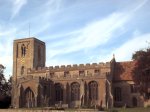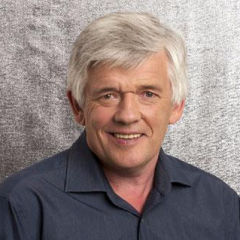
Registered Charity No. 289736
| Diary | Past Events | Fund Uses | JOIN |
| About Us | Constitution | Committee | Links |
 |
Friends Of Holy Trinity Church, Meldreth Registered Charity No. 289736 |
|||||||
|

Peter Allen gave a fascinating insight into his 50 years in the world of journalism. After he left school, he worked for his local newspaper and then emigrated to Australia, where most mornings started with a cool refreshing drink.
In the 1970's, he returned to the UK with his family, initially working in radio with Independent Radio News and LBC, including a spell as a Westminster correspondent and following this with a period at ITN including covering both Gulf Wars.
Peter is probably best known for his work at Radio 5 Live, where, with his co-presenter, Jane Garvey, they have been described as "friendly, informal, brisk, and, mercifully, not terribly politically correct".
Many journalists look forward to an 'exclusive' and Peter found he was the only Westminster correspondent present in 1979 when Jim Callaghan lost a vote of confidence by one vote. Even higher profile reporting was when Diana, Princess of Wales, died and Peter, with James Naughtie, hosted the BBC Radio coverage of her death, which saw Radios 2, 3, 4 and BBC Radio 5 Live joining together to broadcast a single programme.
One interesting Westminster anecdote was when Margaret Thatcher was answering press questions and Bernard Ingham, her chief press secretary, reminded her that they had to leave for another engagement; she insisted on answering more and more questions until she had exhausted the press of all their questions.
Journalism does bring poignant moments and Peter said "Of all the people I have interviewed over the decades, two stand out, not just because of their courage, but because they have the courage to forgive. Suffering seems to have forged them into something finer. The two involved were:
"Harry Wizer, who was in a lift in the Twin Towers when the planes struck. The lift plunged and he thought he would die. Then it juddered to a halt, the doors flew open and he was struck in the face by a fireball; this was presumably aircraft fuel, literally a ball of fire. He was terribly burnt and his lungs permanently scarred; two days leter, his wife only recognised him by his wedding ring. And yet, when I spoke to him years later, actually just after Osama bin Laden had been killed, he was compassionate and calm. Of terrorism he said 'People need to be given a reason to live, not a reason to die.'
"The second was Setsuko Thurlow, a young girl from Hiroshima, who emerged from the horror of that event without anger or hatred or demand for retribution from those who dropped the bomb. She wanted only that the world should be free of nuclear weapons and dedicated her life to that ambition."